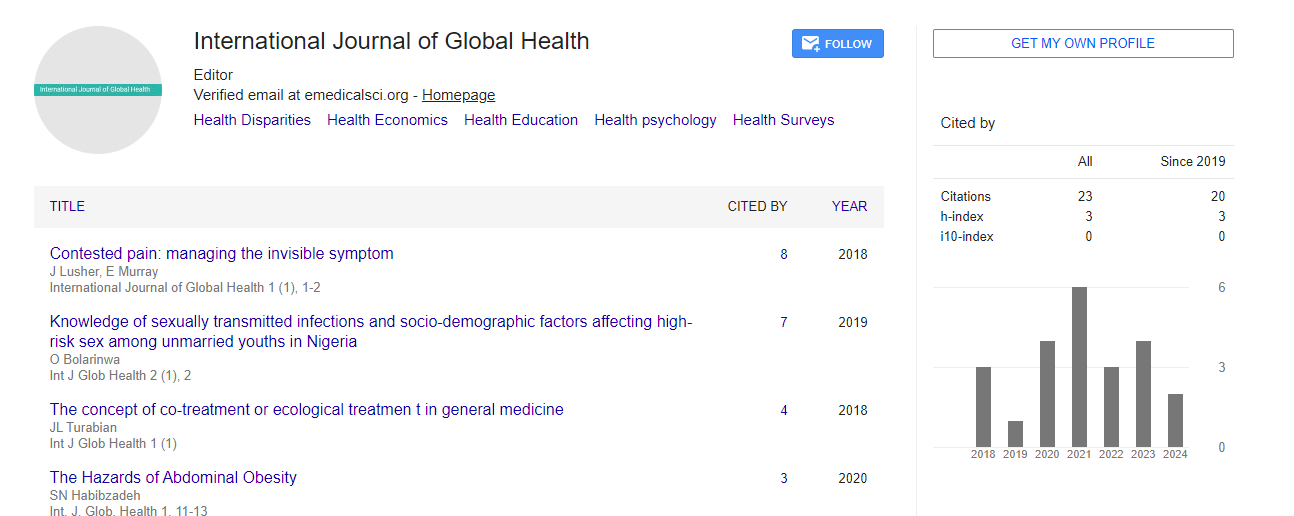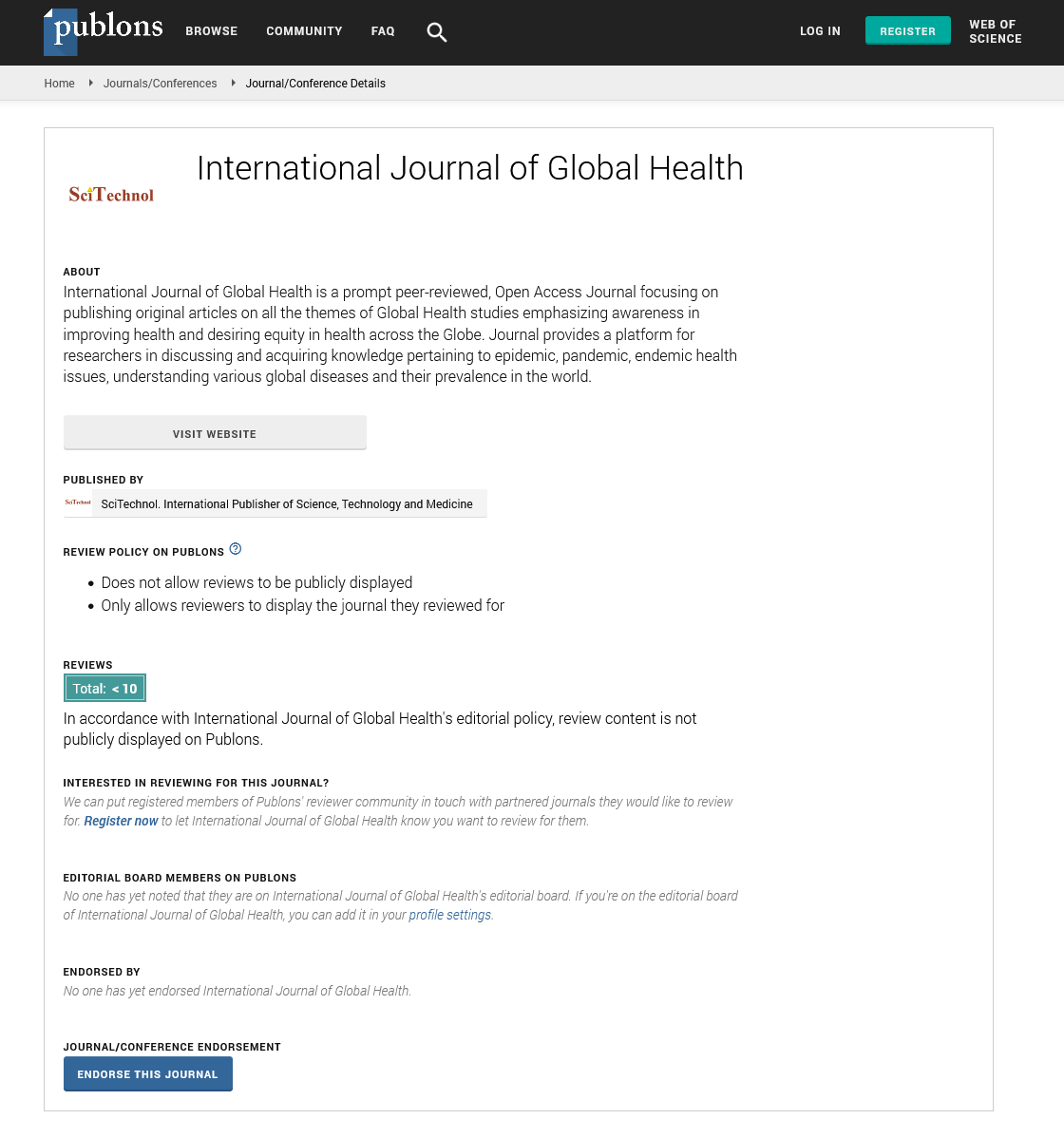Perspective, Int J Glob Health Vol: 6 Issue: 4
Social Determinants of Health: Addressing Inequities for Sustainable Development
Henry Wells*
1Department of Health Policy and Management, Serenity School of Public Health, Calmtown, United Kingdom
*Corresponding Author: Henry Wells,
Department of Health Policy and
Management, Serenity School of Public Health, Calmtown, United Kingdom
E-mail: Henrywell968@gmail.com
Received date: 27 November, 2023, Manuscript No. IJGH-24-125965;
Editor assigned date: 29 November, 2023, Pre QC No. IJGH-24-125965 (PQ);
Reviewed date: 14 December, 2023, QC No. IJGH-24-125965;
Revised date: 21 December, 2023, Manuscript No. IJGH-24-125965 (R);
Published date: 29 December, 2023, DOI: 10.4172/Ijgh.1000201
Citation: Wells H (2023) Social Determinants of Health: Addressing Inequities for Sustainable Development. Int J Glob Health 6:4.
Description
The social determinants of health play a pivotal role in shaping individual and community well-being. These determinants encompass a range of social, economic, cultural, and environmental factors that influence health outcomes. Addressing inequities related to social determinants is integral for achieving sustainable development and fostering health equity on a global scale. Economic conditions significantly impact health. Individuals with lower incomes often face challenges accessing healthcare, nutritious food, and safe living conditions. Addressing income inequalities is essential for promoting health equity. Sustainable development initiatives should focus on creating economic opportunities, implementing fair labor practices, and reducing wealth disparities to improve overall health outcomes. Education is a powerful social determinant that influences health at multiple levels. Higher levels of education are associated with better health outcomes, as educated individuals are more likely to adopt healthier lifestyles, access healthcare, and make informed health decisions. Sustainable development efforts should prioritize equitable access to quality education, including targeted interventios in underserved communities.
The nature of employment and working conditions significantly influences health. Access to safe and secure employment, fair wages, and favorable working conditions contribute to positive health outcomes. Sustainable development strategies should focus on promoting decent work, workers' rights, and occupational safety to address health inequities linked to employment. Housing and living conditions play a crucial role in determining health outcomes. Inadequate housing, overcrowded living spaces, and lack of access to clean water and sanitation contribute to health disparities. Sustainable development initiatives should prioritize the provision of affordable, safe, and sustainable housing, along with infrastructure improvements to create healthier living environments.
Social connections and support networks have a profound impact on health. Strong social ties provide emotional support and can buffer the effects of stress. Sustainable development should encourage community-building initiatives, strengthen social networks, and promote inclusive policies that foster social cohesion, reducing health inequities associated with social isolation. Access to healthcare services is a critical social determinant that significantly influences health outcomes. Disparities in healthcare access contribute to inequities in health status. Sustainable development strategies should aim to establish robust healthcare systems that provide universal access, reduce financial barriers, and address geographic and cultural factors affecting healthcare accessibility.
Cultural and social norms shape health behaviors and influence health outcomes. Sustainable development efforts should respect and promote cultural diversity while challenging norms that perpetuate health inequities, such as gender-based discrimination or stigmatization of certain health conditions. Culturally competent health interventions contribute to more equitable health outcomes. The environment in which individuals live has a direct impact on health. Exposure to environmental hazards, such as air pollution and unsafe drinking water, can contribute to health inequities. Sustainable development strategies should prioritize environmental sustainability, address climate change, and promote policies that ensure clean and safe environments for all.
Recognizing the interconnectedness of various social determinants is essential for understanding and addressing health inequities. Individuals often experience multiple layers of disadvantage based on factors such as race, gender, ethnicity, and socioeconomic status. Sustainable development initiatives should adopt an intersectional approach, acknowledging and addressing the intersecting inequalities that impact health outcomes. Empowering communities to actively participate in decision-making processes is crucial for sustainable development. Including the voices of marginalized communities ensures that interventions are tailored to local needs and address specific health determinants unique to each community.
Conclusion
In conclusion, addressing health inequities related to social determinants is essential for achieving sustainable development and promoting health equity globally. Sustainable development strategies should encompass a holistic approach that addresses economic, educational, environmental, and cultural factors to create conditions that enable everyone to attain their highest level of health. By prioritizing social determinants, the international community can work towards a future where health disparities are minimized, and individuals and communities thrive in conditions that foster overall well-being.
 Spanish
Spanish  Chinese
Chinese  Russian
Russian  German
German  French
French  Japanese
Japanese  Portuguese
Portuguese  Hindi
Hindi 
